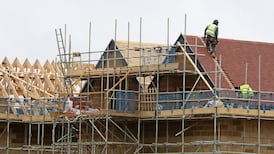The Supreme Court has reserved judgment on a widowed mother of four's battle against a building society's claim that it was entitled to be repaid a £100,000 loan made to her and her 47-year-old husband who died before a mortgage protection policy had been effected.
Mrs Eileen Malone was left with four young children and a newly-purchased grocery, house and pub at Rathmolyon, Co Meath when her husband Sean died on July 29th, 1989.
Last year, in proceedings relating to repayment of the £100,000 mortgage loan for the property, the High Court held Mrs Malone was entitled to damages which should equal any sum due to the Irish Nationwide Building Society on foot of the mortgage.
Yesterday, the Supreme Court reserved judgment on an appeal by the society against the High Court finding.
The Malones applied for a loan through the Irish Nationwide's agent in Trim in February, 1989, and signed an application for mortgage protection insurance with the Caledonian Insurance Company.
The society's agent indicated the matter was urgent as the sale of the property was to take place on March 13th. The society sent a letter of offer for £100,000 on March 10th.
In the Supreme Court, Mr John Gordon SC, for the INBS, agreed that, through an oversight, the insurance application was not forwarded until four weeks later. The Malones had closed the sale on March 13th, had gone on bridging finance and were anxious to draw down the loan.
Mr Gordon said the building society ultimately agreed they could draw down the amount on condition the Malones fully understood the potential consequences of what they were doing and acknowledging the absence of mortgage protection.
Mr Justice Barron asked if the consequences were not a matter for the building society. Mr Gordon said the consequences were for the Malones. If anything went wrong, they would not have insurance.
Mr Gordon said the building society was not without sympathy for the tragedy that befell Mrs Malone. She was left with a young family to run the business and did not have the money to pay the mortgage and she had never paid. Mr Gordon said they knew Caledonian had written to Mr Malone's doctor requiring a report following a physical examination but had not received a reply.
Once Caledonian got the insurance application the events which took place after that were events over which the building society had no influence. The events which led to no insurance at the time of Mr Malone's death could not be laid at the building society's door, he said.
There was acquiescence on the part of the Malones in what transpired on April 21st, 1989; there was a clear agreement that they would proceed (with drawing down the loan) effectively at their own risk, he submitted.
His clients sympathised with Mrs Malone but the society was in the position that it had made a substantial loan which had not been repaid. The premises were now worth a great deal more than when the Malones bought it in 1989.
The reason the society had delayed taking action was because it had no wish or intention to put the Malones "on the side of the road". The society had been at pains not to proceed apace in this matter.
Mr George Brady SC, for Mrs Malone, said the building society had undoubtedly been the Malones' agent for the purpose of effecting the insurance cover. This had been the finding of the High Court. The society claimed its only duty was to forward the application form to Caledonian. But the Malones had paid an additional £1,200 to the society of which £1,000 was charged to "administration".
The society failed to effect the insurance cover on behalf of the Malones notwithstanding repeated promptings from the Malones' solicitor. The Malones had not been free to seek their own insurance cover; the Irish Nationwide required them to do it through the Caledonian.
Mr Brady said the Irish Nationwide knew the medical report on Mr Malone was still outstanding and did nothing about it. Prior to his death, Mr Malone had given a direct debit to the Irish Nationwide to cover repayments - including repayments for the mortgage protection insurance. When the company failed to lodge the direct debit Mr Malone made the payments to Irish Nationwide to cover a three-month period, counsel added.









